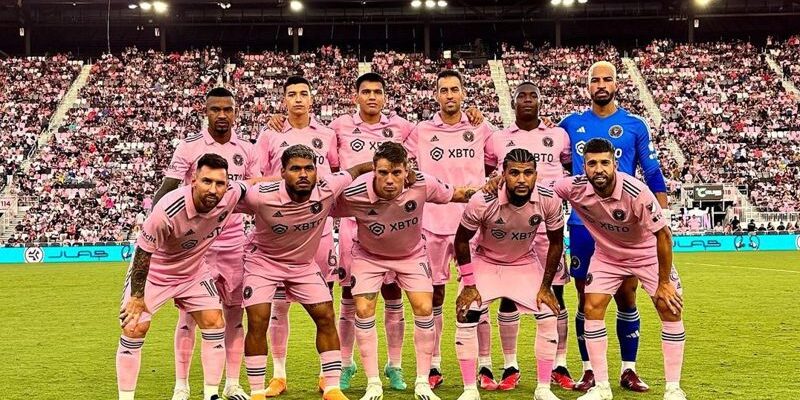Inter Miami, a club that seemingly operates on a different plane of ambition within Major League Soccer, has once again made headlines with an acquisition that defies conventional wisdom. Not content with merely bringing Lionel Messi and Sergio Busquets to American shores, the Floridian franchise has now secured the services of World Cup-winning midfielder Rodrigo De Paul. This isn`t just another high-profile signing; it`s a strategic masterstroke that underscores Miami`s relentless pursuit of dominance and challenges the very fabric of MLS roster construction.
The Architect`s Blueprint: Navigating MLS Roster Conundrums
In MLS, financial fair play often feels more like financial gymnastics. Teams are permitted only three “Designated Players” (DPs), whose salaries can exceed the league`s strict cap. Messi, Busquets, and Jordi Alba already occupy these coveted slots for Inter Miami, presenting a seemingly insurmountable barrier to adding another global talent of De Paul`s caliber. Yet, where others see limits, Miami`s management appears to see mere suggestions.
The solution? A shrewd, albeit complex, maneuver involving a loan agreement with Atlético Madrid. De Paul joins initially as a “Targeted Allocation Money” (TAM) player, a designation that allows clubs to “buy down” a player`s salary below the DP threshold using a special fund. This technicality, a testament to the intricate ballet of MLS financial regulations, means that while De Paul is clearly a player of Designated Player stature, he won`t occupy one of those precious slots—at least not yet. Reports suggest an option to buy him permanently for a significant sum next season, at which point he would likely transition to a DP role, perhaps as roster circumstances evolve with other players.
To further facilitate this move, Miami executed a trade with Atlanta United, exchanging General Allocation Money and a player for an international roster spot. This intricate series of transactions showcases a club committed to finding every legal loophole and avenue to assemble a championship-contending squad. It’s an exercise in strategic audacity, proving that when the will to win is strong enough, even the most rigid rules can find a degree of flexibility.
A Prime Asset, Not a Retirement Tour
What sets De Paul`s arrival apart from many previous high-profile MLS transfers—such as those of Frank Lampard, Steven Gerrard, or Andrea Pirlo, all phenomenal talents who joined later in their careers—is his age and current form. At 31, Rodrigo De Paul is not merely an iconic name; he is an active, peak-performance midfielder who has been a consistent engine for Atlético Madrid in La Liga and a tireless presence for the Argentine national team, famously dubbed “Messi`s bodyguard” during their triumphant World Cup campaign. His addition is not a sentimental gesture; it is a calculated injection of contemporary elite quality.
On the pitch, De Paul’s impact is expected to be immediate and profound. His boundless energy, tenacious tackling, and astute passing provide a dynamic counterpoint to Busquets’ elegant deep-lying playmaking. He offers defensive cover, allowing Busquets more freedom, but also possesses the ability to drive forward, link play, and unleash powerful shots from distance – a complete midfielder profile. For Inter Miami, which has struggled with defensive solidity at times, De Paul’s presence is akin to a tactical refresh, solidifying the spine of the team and enabling the attacking triumvirate of Messi, Alba, and now potentially Luis Suarez, to operate with even greater freedom.
Beyond the Pitch: The Messi Effect and Miami`s Lofty Ambitions
The acquisition of Rodrigo De Paul further solidifies the notion that Lionel Messi`s presence in MLS has profoundly altered the landscape of player recruitment. Where once top European talents viewed MLS as a post-prime destination, Messi`s magnetism, combined with Inter Miami`s aggressive recruitment, is demonstrating that the league can now attract players still operating at the highest level of their careers. It`s a significant shift, challenging the perception of MLS as a “retirement league” and positioning it as a genuinely competitive and attractive destination.
Inter Miami`s ambitions extend far beyond individual match victories. The club is clearly building a dynasty, a team capable of competing for the MLS Cup and other international honors with consistency. De Paul`s signing is a crucial piece in this grand design, signaling to the world that Miami is serious about being more than just a destination for aging stars; it aims to be a hotbed for current elite talent.
The Debut: Leagues Cup and Beyond
All eyes now turn to the Leagues Cup, where Rodrigo De Paul is expected to make his Inter Miami debut against Atlas. This tournament, which Inter Miami famously won last year with Messi leading the charge, serves as an immediate testing ground for the club’s renewed aspirations. His integration will be swift, and the synergy with his former national teammates is anticipated to be seamless. For fans, the prospect of seeing this formidable midfield in action, orchestrating play and protecting the defense, is a tantalizing prospect that promises an exhilarating period for the club.
In essence, Rodrigo De Paul`s arrival at Inter Miami isn`t just about bolstering a squad; it’s about pushing the boundaries of what is achievable within MLS, both on the financial ledger and on the pitch. It’s a bold statement, a testament to audacious ambition, and a clear signal that Inter Miami, with Messi at its heart, is setting a new, higher standard for excellence in North American soccer.









